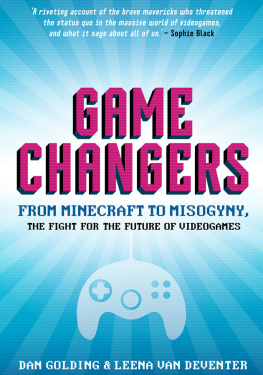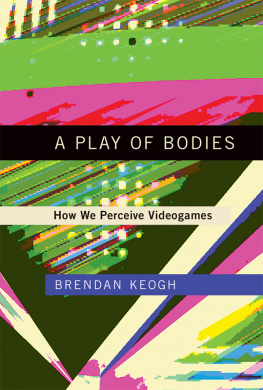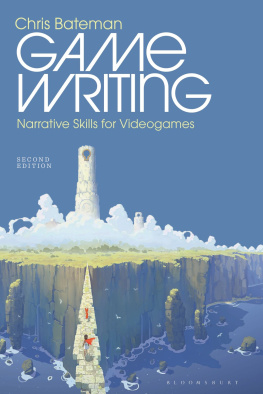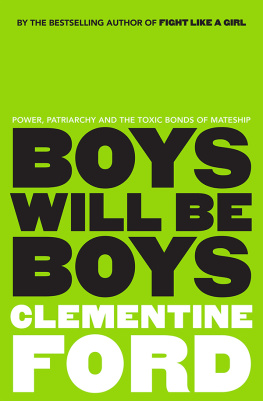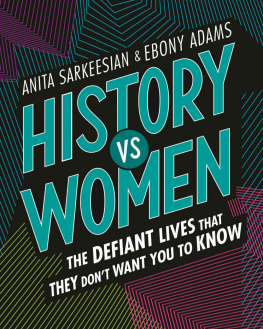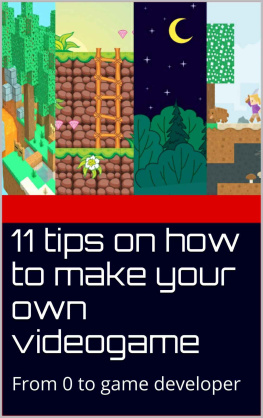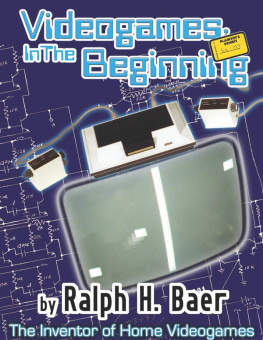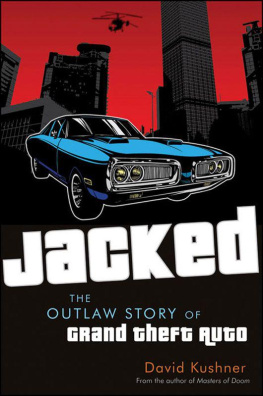Dan Golding is a critic and academic, and the director of the Freeplay Independent Games Festival. He holds a PhD from the University of Melbourne, and is a lecturer in Media and Communications at Swinburne University of Technology.
Leena van Deventer is an award-winning game developer, writer and teacher from Melbourne, Australia. She has taught interactive storytelling at RMIT and Swinburne Universities, and is co-founder and director at WiDGET (Women in Development, Games & Everything Tech), a not-for-profit organisation supporting women game developers and women in IT.
Published by Affirm Press in 2016
28 Thistlethwaite Street, South Melbourne, VIC 3205.
www.affirmpress.com.au
Text and copyright Dan Golding & Leena van Deventer, 2016
All rights reserved. No part of this publication may be reproduced without prior permission of the publisher.
All reasonable effort has been made to attribute copyright and credit. Any new information supplied will be included in subsequent editions.
National Library of Australia Cataloguing-in-Publication entry available for this title at www.nla.gov.au.
Title: Game Changers / Dan Golding & Leena van Deventer, authors.
ISBN: 9781925344509 (paperback)
Cover design by Blue Cork
Typeset in Garamond Premier Pro 12/18 pt by J&M Typesetting
The paper this book is printed on is certified against the Forest Stewardship Council Standards. Griffin Press holds FSC chain of custody certification SGS-COC-005088. FSC promotes environmentally responsible, socially beneficial and economically viable management of the worlds forests.
Contents
Introduction
One morning you wake up to find eleven new texts on your phone. Missed calls, too some from friends, some from unknowns. Alarmed, you notice that youve also got four hundred red Facebook notifications. You open Twitter to find over five hundred mentions. As you skim them, your stomach drops.
A few people are sending kind messages of support, but mostly total strangers are saying horrible, hateful, violent things to you. A lot of these strangers have new accounts with default profiles and anonymous usernames. Youre a fraud, they say. Youre a liar and you dont deserve anything. You should be raped and mutilated.
Thats what your many new emails say, too. You laughed at the first few, mainly because they seemed so absurd, but youre not laughing now. A few minutes later, you can no longer access your email. Someone is trying to guess your password.
Your landline rings its your parents. Theyre concerned because someone called them at home and said nasty things about you. They dont know whats going on either.
You start sorting more carefully through the hundreds of Twitter notifications and notice that someone has sent you a message that makes it pretty clear that they know where you live. Another one says that theyre coming to your house today. You call a friend and tell them that youll need to stay at their place and you dont know how long it will be before you can come home.
All of this is happening, you realise, because you make videogames. Or maybe you write about videogames. Maybe you even just tweeted something offhand about videogames the day before this began.
But heres the crucial bit of information: youre a woman.
Something seismic is happening in the world of videogames. Over the past couple of years, the word gamer has become a popular byword for harassment and abuse. Games have been taken to the front page of the New York Times and to the United Nations. And many of us who live and work with games have been forced to wonder what were doing here and what kind of an industry we want to take part in.
Are things getting better? Are they getting worse? Who is changing things, and why? In later chapters we talk to two people we consider to be game changers: Anita Sarkeesian and Zo Quinn. Their tireless work advocating for different stories created by different makers has seen them subject to both admiration and scorn, with the highs being high and the lows being gut-wrenchingly low.
For decades after their commercial beginnings in the 1970s, videogames were both everywhere and nowhere. Many people were players, but few took games seriously. The word videogames was tossed around in conversations about troubled youth, about procrastination, about violence, while the universal time-wasters between work meetings were Solitaire on Windows 3.1, then Snake on Nokia 3310. Fantasy football guides took up expensive print space in national newspapers.
Both the world at large and gaming insiders were happy to pretend that videogames were somehow separate from other cultural works. Mainstream thinking had it that gamers were always somebody else geeks, dweebs, nerds, losers and that making, discussing and loving games happened in a closed-off clubhouse. For anyone who was teased and mocked for liking games, this clubhouse was safe and comfortable, away from prying eyes and people who just didnt get it.
With the rise of the internet, the world has changed. The canary in the coal mine died in August 2014, when a disgruntled young man posted an angry rant about his ex-girlfriend. Since then, something now known as Gamergate has set off the complete implosion of gender politics in the videogames world. In the United States, credible death threats have been made against Gamergate targets. Games have become a battleground in an all-out culture war fed by politics, the internet, a risk-averse industry (one of the most profitable in the world), and a form of feminism framed by all of that and more. This battle is ongoing, and realistically it may never be won or lost.
Gamergate signalled the breakdown of the long-imagined separation between videogame culture and everything else. These days, whatever your attitude to games, theres no denying that theyre a part of everyday life from Facebook feeds, to ads on public transport, to articles in the mainstream media, to kids using Minecraft in classrooms, to some of the most contentious cultural battles in our society. Videogames are a deeply normal part of life for most kids growing up today, something that can be a challenge for some parents. They are important to everyone today young and old and the debates that surround them can sometimes be even more important.
The two of us have been involved in the Australian industry for years as creators, critics and players. Were both passionate about making things better for women and minorities in games, and by extension the industry and culture at large. Were not only tired of being embarrassed to admit at parties that we love games, but were also tired of the pushback from terrified, self-identified gamers when we try to facilitate the broadening diversity of game makers, producers and reviewers. Most of all, were sick of people having their lives threatened and being sent graphic rape threats over our favourite pastime.

